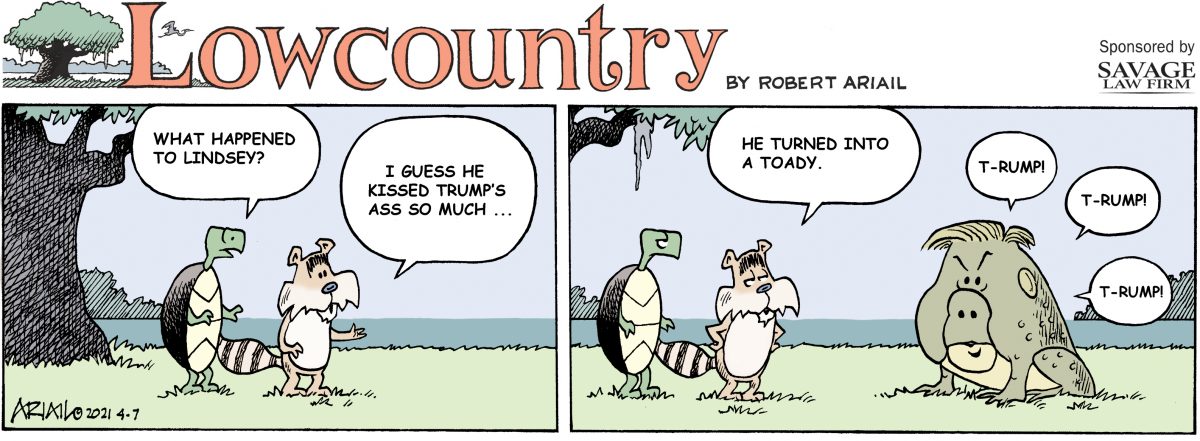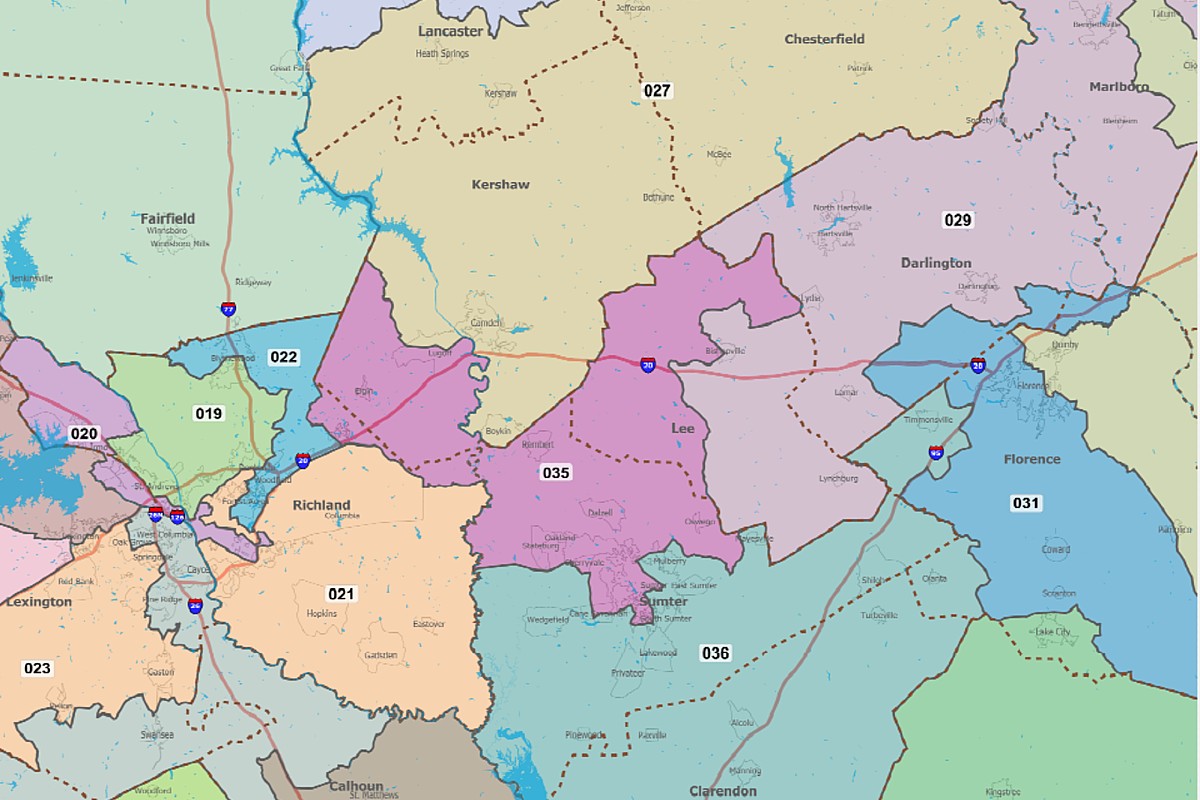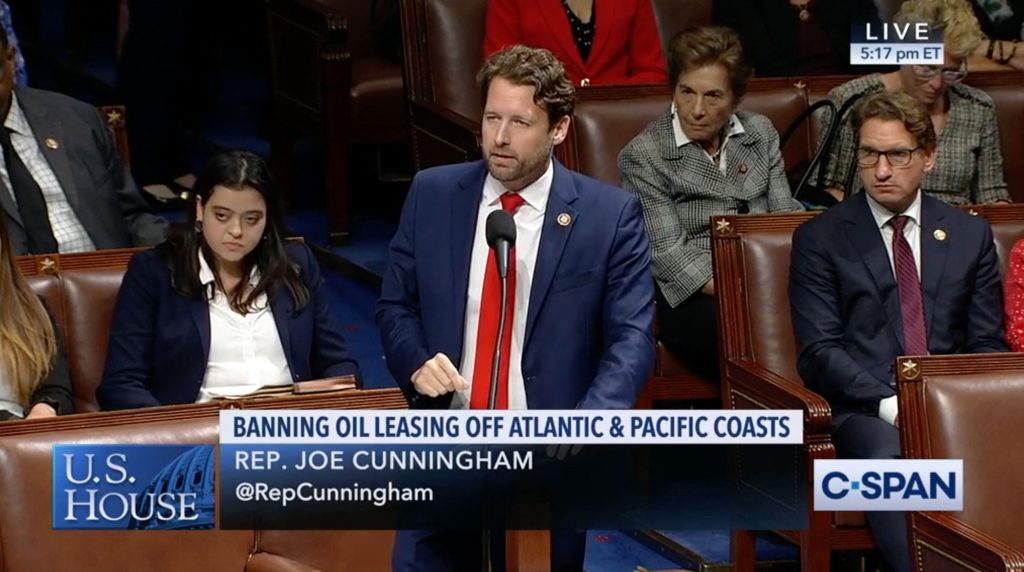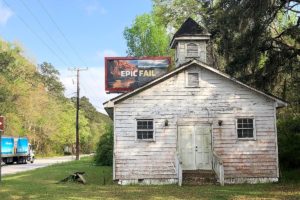STATEHOUSE REPORT | ISSUE 20.15 | APRIL 9, 2021
BIG STORY: Bill incentivizes control of pit bull births
NEWS BRIEFS: Milestone: S.C. House passes hate crimes bill
LOWCOUNTRY, Ariail: South Carolina’s toady
COMMENTARY, Brack: Redistricting delay is a public shame
SPOTLIGHT: The Felkel Group
MY TURN, Cunningham: State should be leader on voting rights
FEEDBACK: Open carry without education promotes intimidation
MYSTERY PHOTO: Gator control
Bill incentivizes control of pit bull births

By Andy Brack, editor and publisher | Animal shelters across the state are pushing a new bill they say would incentivize owners of pit bulls and related dogs to spay or neuter their pets which, in turn, would curb populations across the state.
Registration wouldn’t be required for pit bull-type dogs (PBTDs) that are already spayed or neutered under the bill, H. 4094, filed March 17 by S.C. Rep. Chip Huggins, R-Lexington, on behalf of animal shelters across the state.
While registration of “fertile pit bulls” would be required in the new bill, the proposed cost is $25, which is $475 less than a similar 2019 bill that raised hackles of some pet owners.

“We hate mandates in South Carolina. We hate them,” Huggins said Thursday. “They’re trying to make this where it’s not a mandate where they (PBTD owners) have already taken care of their breed.”
Reducing the population
Animal shelter professionals say a bold program to spay or neuter pit bulls, viewed by many as loving and loyal dogs that have gotten a bad reputation by those who breed them for illegal dog fights, will help control populations of unwanted dogs.
“These wonderful dogs are by far the most overpopulated and threatened type of dog in South Carolina,” said Joe Elmore, president and CEO of the Charleston Animal Society. “Pit Bull-Type Dogs account for a disproportionate number of dogs both entering shelters and euthanized at an even higher rate in shelters.
“It’s simple supply and demand – there are far too many than there are homes. And, it’s costing taxpayers and donors millions of dollars each year.”

In 2018, for example, nine shelters in South Carolina took in almost 20,000 dogs. Almost 6,000, or 30 percent of the dogs, were pit bulls and pit mixes, Elmore said. In seven shelters, about half of the 3,240 dogs that were euthanized that year were PBTDs.
Barbara Nelson, who heads the SPCA Albrecht Center for Animal Welfare in Aiken, has a contract to accept Aiken’s stray dogs. Some 70 percent are pit bulls or mixes, she said.
“They are the most difficult to adopt and the most returned to us after adoption,” she said. “We also see that they are the most neglected and abused.”
She said spay-and-neuter programs work to control pit bull populations as highlighted since Aiken passed an ordinance in 2005 that required a $100 one-time registration of fertile dogs.
“In 2005, there were 635 dogs admitted to SPCA by the city,” she said. “In 2020, there were 217. When faced with the $100 fee and associated penalties, owners generally choose to spay or neuter.
“At the same time, the city set up a voucher system to cover the cost of spaying or neutering for those who could not afford it.”
Increasing safety
Spaying or neutering reduces dog aggression, activists say, which makes pets safer.
Huggins’s bill is called “Jayce’s Law” in honor of a Hampton County boy who died in January after a dog attack.
Elmore pointed to 2019 data that showed there were 7,499 dog bites from known breeds, according to the S.C. Department of Health and Environmental Control. Of those, a third, or 2,433 bites, were by pit bulls or mixes, while the next-highest biters were Labradors and their mixes with 833 bites.
“Studies indicate that approximately two-thirds of dog bites occur by unaltered dogs,” Elmore said.
He added that passing Huggins’ bill would help to save the lives of dogs, reduce harm to children and adults, make it tougher for people to engage in dogfighting, and save millions of dollars for taxpayers and insurance policy owners.
The relatively low cost of registering an unaltered dog as would be worth it, Elmore said, because it’s not a burden. The $25 fee is the “cost of one cheap bag of dog food,” he said
Reducing the number of pit bulls and mixes also means fewer dogs will be euthanized across the state, he added.
The bill currently is in the House Judiciary Committee. Huggins said he hopes it can get to the House floor and be sent to the Senate this year for consideration in the upper chamber next year.
- Have a comment? Send to: feedback@statehousereport.com. Make sure to add your name and contact information for verification.
Milestone: S.C. House passes hate crimes bill

By Sam Spence, special to Statehouse Report | South Carolina is one step closer to having a hate crimes law after House members passed the legislation Wednesday.
By a count of 79-29, the bill passed with little debate. South Carolina is one of three states that does not differentiate during prosecution between crimes motivated by hate or bias. For years, activists and equal-rights advocates pushed the measure, but even after the 2015 Emanuel A.M.E Church killings by a white supremacist in a state with a long history of racism, the proposal never gained traction.
Only since nearby Georgia passed a similar law last year did the bill make progress in South Carolina. The state Chamber of Commerce this year also pushed the measure.
The bill, filed by Charleston Democratic state Rep. Wendell Gilliard, is named in honor of former S.C. Sen. Clementa Pinckney, the minister of Emanuel A.M.E. Church in Charleston who was killed during the church shooting.
The bill, as passed, increases penalties for people convicted of crimes motivated by the victim’s race, color, religion, sex, gender, national origin, sexual orientation, or physical or mental disability. The bill is modeled after the Georgia legislation, but does not include reporting requirements that make up a large portion of that proposal.
At one point while the bill was in committee, protections for LGBTQ people were stripped from the proposal, but they were later added back.
The House bill now heads to the Senate, where it is eligible to be considered before the 2021-half of the two-year legislative session ends.
More coverage: The State | AP News
Sam Spence is editor of the Charleston City Paper, where this story first appeared.
In other recent news:
![]() S.C. legislators have $1.7B extra for budget. The Palmetto State’s economy is weathering the pandemic better than feared, giving legislators a $1.7 billion boost in tax revenue to spend in the upcoming budget. More: The State.
S.C. legislators have $1.7B extra for budget. The Palmetto State’s economy is weathering the pandemic better than feared, giving legislators a $1.7 billion boost in tax revenue to spend in the upcoming budget. More: The State.
Previous coverage: A look at the $10 billion House spending plan. Statehouse Report.
S.C. House passes bill for open carry of guns — without training. After passing legislation allowing trained gun owners to openly carry weapons in March, the South Carolina House of Representatives has approved another bill — this time eliminating any need for training. More: The Post and Courier | The State.
S.C. Senate looks at barring mandatory shots. The S.C. Senate unanimously approved Wednesday a proposal to prevent employers from mandating COVID-19 vaccines for workers. The resolution says employers cannot punish or fire workers for refusing to be vaccinated for the virus, and that the state health agency cannot require people who refuse to vaccinate to quarantine or isolate themselves. The measure now heads to the House. More: AP News.
Wood goes to war with prominent S.C. Republicans. Georgia attorney Lin Wood — a fierce supporter of Donald Trump — is targeting U.S. Sen. Lindsey Graham and former governor and Trump appointee Nikki Haley in his bid to lead the state’s Republican Party. He spoke in Greenville recently. Wood is trying to unseat Drew McKissick, who has been endorsed by Trump. More: AP News.
Also see: Inside the S.C. GOP’s MAGA coup, The Daily Beast.
Audit shows spike in violent incidents at Juvenile Justice. Understaffing at state Juvenile Justice facilities and poor training are being fingered for an increase in violent incidents at the facilities by the South Carolina Legislative Audit Council. More: The Charlotte Observer.
S.C., half of U.S. states at extreme risk for gerrymandering, group warns. More than half of the states in the U.S. are at “extreme risk” of congressional districts being redrawn to favor one party, according to a study of redistricting processes by a nonprofit advocacy group. More: Charleston City Paper.
Bill to ban transgender girls from high school sports returns. A measure to bar transgender girls from competing in high school sports has resurfaced days ahead of the statehouse crossover deadline that likely would have quashed it for the year. More: The Post and Courier.
Report identifies 745 structurally deficient S.C. bridges. A new report put together by the American Road and Transportation Builders Association finds there are 745 bridges in South Carolina that are classified as structurally deficient. More: WCSC.
McMaster to pick McCoy to lead Santee Cooper. Gov. Henry McMaster plans to tap former U.S. Attorney Peter McCoy, a Charleston Republican to lead South Carolina’s embattled state-owned utility Santee Cooper, according to Senate Republican leaders. More: The Post and Courier.
McMaster taps former Medicaid director to lead agency again. McMaster also said Wednesday that he will nominate a former state Medicaid director to return as the agency’s leader. Robert Kerr headed the department under former Gov. Mark Sanford. The agency has been without a permanent director since Joshua Baker resigned in January. More.: AP News.
South Carolina’s toady

Here’s a new cartoon by Robert Ariail that first was published in our sister newspaper, the Charleston City Paper. Love it? Hate it? What do you think: feedback@statehousereport.com.
Redistricting delay is a public shame

By Andy Brack, editor and publisher | Every 10 years in spring like clockwork, the General Assembly is mired in the minutia of redrawing election lines as required by the U.S. Constitution.
 Except this year because of a double-whammy that has delayed everything for months.
Except this year because of a double-whammy that has delayed everything for months.
First came an assault on the Census process by the Trump Administration. While the Constitution requires every person living in the United States to be counted every decade, Trump and his cronies wanted to change the rules in an obvious effort to marginalize the count of non-citizen residents. Officials tried to do this by asking people about their immigration status, which states and activists said would chill legal immigrants from participating in the 10-year count because they would be afraid of what would happen if they gave information to the almighty government. By 2019, the U.S. Supreme Court ruled the administration’s insistence on an immigration question was “arbitrary and capricious,” causing the feds to drop the question after a whole lot of drama.
The second part of the whammy was the pandemic, which made collection of results difficult. In fact, the Commerce Department extended the deadline for data collection by three months last year to the end of October, although the Trump Administration again fiddled with the process to end the extension early, which the courts approved.
Bottom line: The annual Census, normally as regular as rain, has been a chaotic mess because of natural and Trump-made disasters. And that’s thrown off the whole process.

On one hand, it’s not terrible news, as observed by Clemson professor Matthew Saltzman, who works on redistricting as a member of the League of Women Voters of South Carolina.
“The delay gives those of us that want to participate and to engage the public in the process more time to get our processes and our outreach efforts up to speed,” he says.
But remember redrawing voting lines is done by House members and senators in a kind of fox-guarding-the-henhouse manner. And so far, they haven’t even gotten started. No leaders of the process have even been appointed. The Census data isn’t expected until the end of September, which will cause all sorts of rushing around. And that will give advantages to the people drawing the lines because citizens watching will have less time to come up with alternatives that may be fairer than what the foxes develop.
“When legislators are left to draw lines on their own, behind closed doors, they are able to bring a significant amount of control to the outcome of district elections,” Saltzman said. “They can protect incumbents — an actual requirement in Statehouse guidelines in 2011 — or assign voters to districts in ways that bias the outcomes strongly toward one party or the other.”
He pointed out South Carolina voters faced uncontested general elections in more than half of House seats in 2020 and a third of Senate seats.
“That lack of competition means that legislators are beholden to their primary voters and special interests and much less so to their constituents as a whole.”
With a compressed timetable, South Carolina legislators likely may get new lines before the March primaries as many expect a special fall session to hammer out details. But if they’re delayed for one reason or another, primaries could be delayed.
Meanwhile, municipalities with elections this year have two options — to hold elections using current lines or delay municipal elections to have new districts that apportion voters fairly.
Whatever happens, the lack of action by this point in time is a pure shame. This year’s reapportionment is a result of partisan chaos intentionally caused by a former administration to create distrust in a process that should be as routine as the sun rising daily.
Andy Brack is editor and publisher of Statehouse Report and publisher of the Charleston City Paper. Have a comment? Send to: feedback@statehousereport.com.
The Felkel Group
 The public spiritedness of our underwriters allows us to bring Statehouse Report to you at no cost. This week in the underwriter spotlight is The Felkel Group, a battle-tested public affairs and business development firm that assists corporations, associations and not-for-profits that are serious about their long-term success. The Felkel Group solves problems, crafts and delivers messages, helps organizations to manage crisis, and uses a wealth and breadth of valuable relationships to help to seal deals.
The public spiritedness of our underwriters allows us to bring Statehouse Report to you at no cost. This week in the underwriter spotlight is The Felkel Group, a battle-tested public affairs and business development firm that assists corporations, associations and not-for-profits that are serious about their long-term success. The Felkel Group solves problems, crafts and delivers messages, helps organizations to manage crisis, and uses a wealth and breadth of valuable relationships to help to seal deals.
The Felkel Group is also home to an outstanding advocacy tool called The Rap Index, a powerful intelligence tool that employs sophisticated computer modeling and profiling techniques to help organizations find their most effective advocates. To learn more about The Felkel Group and its Rap Index, go to: http://www.felkelgroup.com.
State should be leader on voting rights

By Joe Cunningham | In 2018, I won an election no one expected me to win. I became the first Democrat in 40 years to win the 1st Congressional District — a district that voted for Donald Trump by 13 points just two years prior. But in 2020, I lost by 1 percentage point in one of the closest elections in the country. Unlike President Trump and his most fervent allies, I didn’t concoct bizarre conspiracy theories about the validity of the election or attempt to strong-arm election officials into “finding” more votes. I called my opponent, congratulated her, and conceded.

That’s the way it is supposed to work in America. But in today’s divisive and polarized political environment, it seems a politician cannot lose without alleging some sort of voter fraud or irregularities. These dishonest political tactics erode the pillars of our democracy and deliberately mislead the public into believing demonstrable lies. Despite his laughable accusations, the 2020 election was no more stolen from Donald Trump than it was stolen from me. Trump’s debunked claims have now appropriately been dubbed, “The Big Lie,” and led to the infamous insurrection of the United States Capitol on Jan. 6 and resulted in the death of several Capitol Police officers. The danger of degrading our democracy has been put on full display.
Now we are seeing politicians all across the country, in a subtle nod to the “Big Lie,” seek to pass new restrictions on voting.
In Iowa, the Republican governor signed a bill that cuts the state’s early voting period by nine days, closes polls an hour earlier on election day and makes it much more difficult to vote by mail.
In Georgia, in a clear response to Democrats winning two U.S. Senate seats and the presidential election, Republicans passed a 98-page bill that radically curtails ballot access for voters and makes it easier for partisan Republicans in the legislature to overturn elections they — falsely — deem as illegitimate. They even stripped the secretary of state of his authority to oversee elections.
These are just a few examples of the tidal wave of voter suppression that is crashing through Republican legislatures nationwide. Forty-five other states have introduced similar measures to restrict access to the voting booth and make it harder for people — particularly people of color — to cast their vote. It is wrong, unnecessary, and clearly intended to tip the scale for Republicans.
In the face of this disturbing trend, South Carolina should take this opportunity to show that we are different, that we are committed to increasing every voter’s access to the polls.
There are five key steps we can take to make it easier to vote while ensuring the integrity of our elections.
First, we should pass automatic voter registration for every person who turns 18 years old. Rather than requiring them to opt-in, take away the bureaucracy and make them eligible to vote automatically. We do it for military service, why not voting?
We need to follow the lead of our neighbors to the north and 18 other states and allow same-day registration. If an eligible, but unregistered, voter travels to his or her voting location, they should be able to show the appropriate credentials, register and cast their vote.
We should end straight-ticket voting, which only three other states in the country allow. We should be discouraging blind partisanship, not the opposite.
We should also end the unnecessary requirement of needing an excuse to vote early. In South Carolina, voters currently need some sort of approved excuse to vote in-person absentee, such as a work conflict or if they will be out of town on election day. This causes unnecessary widespread confusion when voters should have the ability to vote early if they wish.
Finally, it’s time for South Carolina to end its practice of partisan gerrymandering, where politicians get to draw their own district lines and pick their voters. Gerrymandering encourages partisanship and discourages cooperation. It leads to government dysfunction, gridlock and governing by the extremes.
At a time when voting rights are under assault and conspiracy theories about our elections run rampant, now is the time for the adults in the room to step up and lead our state towards common sense reforms to make it easier to vote and harder to cheat.
Joe Cunningham, of Charleston, represented the 1st Congressional District in the U.S. House of Representatives from 2019-2021. This commentary first appeared in the Charleston City Paper.
Open carry without education promotes intimidation
To the editor:
![]() INTIMIDATION is the sole reason for the open carry of a firearm in our society. We do not need to go down this road in South Carolina as we all attempt to bring forth a better way of life. This will be perdition without civil recourse. An indelible mark inhibiting a well-functioning social discourse that needs much more rehabilitation.
INTIMIDATION is the sole reason for the open carry of a firearm in our society. We do not need to go down this road in South Carolina as we all attempt to bring forth a better way of life. This will be perdition without civil recourse. An indelible mark inhibiting a well-functioning social discourse that needs much more rehabilitation.
Legislators put their lives at high risk to meet with constituents. Some legislators might try open carry to ward off a threat. The Gabby Gifford shooter[in Arizona] had a sidearm holstered. It was a Glock 19. He got off 19 rounds.
The news reports of open carry in the Michigan Statehouse reveals the intimidation. Eight months after armed protestors festooned their open carry rifles and sidearms in Michigan’s statehouse, officials banned all open carry weapons there. Michigan legislators closed the door to this type of intimidation.
Legislators understood protection is in the carry permit, not on the hip display. They rewrote a law to protect their rear ends. Just as S.C. legislators will say open carry (without education) is not permitted in the S.C. Statehouse by putting up a flimsy ambiguous notice sign.
Education and posting of prohibition signs are the charade to legitimize intimidation in our state. Passage of an open carry law in S.C. with or without “education” will be one big mistake. There is no saving grace here. Poisoned at the root.
Decloaking the intimidation intent of this most dangerous wolf in wooly clothing legislation. No matter how tempered or qualified, a very small minority of yahoos will force us against our collective will, to live in an overt quasi-military environment, go back to the Wild West days and the good old Jim Crow days, where guns were flashed abundantly.
— Fred Palm, Edisto Beach
Send us your thoughts
We love hearing from our readers and encourage you to share your opinions. But to be published, you’ve got to provide us with contact information so we can verify your letters. Letters to the editor are published weekly. We reserve the right to edit for length and clarity. Comments are limited to 250 words or less. Please include your name and contact information.
-
- Send your letters or comments to: feedback@statehousereport.com
Gator control

This should be the easiest mystery we’ve offered in a long time. Look familiar? Send your guess to feedback@statehousereport.com — and remember to include your name, home city and contact information.
 Last week’s mystery, “Epic fail,” showed an old, seemingly abandoned church along U.S. Highway 17 in Jacksonboro, S.C. Nearby was a billboard that said “Epic fail,” which seems like what’s happened to the church.
Last week’s mystery, “Epic fail,” showed an old, seemingly abandoned church along U.S. Highway 17 in Jacksonboro, S.C. Nearby was a billboard that said “Epic fail,” which seems like what’s happened to the church.
Elizabeth Jones of Columbia was the first of few to identify the church, which she described as “beautiful and sad” and said she would like to know more about it. Which Allan Peel of San Antonio, Texas, provided in his answer:
“Today’s mystery photo is of the Wesley CME Church in Jacksonboro, S.C. Located at the intersection of Ace Basin Parkway (U.S. Highway 17) and Hope Plantation Lane. The church was named after the 18th-century Methodist founder, John Wesley (1703-1791), an English cleric, theologian and evangelist, who was the founder of the Methodist Revival Movement within the Church of England.
“Churches like the Wesley CME were bulwarks against segregation and discrimination across the South for over 100 years, providing witness to the value of human lives – lives that Jim Crow tried to throw away. As with many other Protestant denominational churches, it is evident that the Wesley CME Church was designed and built around simple lines and functionality, devoid of elaborate marble and gilded cornices that make up so many other places of worship. A door, two windows, and a modest steeple make up the face of this church; any more decorative elements would have been considered superfluous and wasteful.
“According to the property tax records for this property here, the church is 1,152 square feet in size and sits on a 0.2-acre lot. As of Dec. 31, 2019, it had a market valuation of $33,300. It was last sold (granted) by Fraser W. Whaley to the Wesley CME Church on Jan 8, 1983, for $3.00 (yes … you read that correctly … 3 bucks!). Clearly Whaley was a very generous man! Interestingly, the property tax records also show a sale date of July 4, 1776!”
Also identifying the photo correctly were George Graf of Palmyra, Va.; Frank Bouknight of Summerville; and Jay Altman of Columbia.
- Send us a mystery. If you have a photo that you believe will stump readers, send it along (but make sure to tell us what it is because it may stump us too!) Send to: feedback@statehousereport.com and mark it as a photo submission. Thanks.
ORDER NOW: Copies are in Lowcountry-area bookstores now, but if you can’t swing by, you can order a copy online today.
ABOUT STATEHOUSE REPORT
Statehouse Report, founded in 2001 as a weekly legislative forecast that informs readers about what is going to happen in South Carolina politics and policy, is provided to you at no charge every Friday.
Meet our team
- Editor and publisher: Andy Brack, 843.670.3996
- Special correspondent: Lindsay Street
Donate today
We’re proud to offer Statehouse Report for free. For more than a dozen years, we’ve been the go-to place for insightful independent policy and political news and views in the Palmetto State. And we love it as much as you do.
But now, we can use your help. If you’ve been thinking of contributing to Statehouse Report over the years, now would be a great time to contribute as we deal with the crisis. In advance, thank you.
Buy the book
Now you can get a copy of editor and publisher Andy Brack’s We Can Do Better, South Carolina! ($14.99) as a paperback or as a Kindle book ($7.99). . The book of essays offers incisive commentaries by editor and publisher Andy Brack on the American South, the common good, vexing problems for the Palmetto State and interesting South Carolina leaders.
More
- Mailing address: Send inquiries by mail to: P.O. Box 21942, Charleston, SC 29413
- Subscriptions are free: Click to subscribe.
- We hope you’ll keep receiving the great news and information from Statehouse Report, but if you need to unsubscribe, go to the bottom of the weekly email issue and follow the instructions.
- Read our sister publications: Charleston City Paper (every Wednesday) | Charleston Currents (every Monday).
- © 2021, Statehouse Report, a publication of City Paper Publishing, LLC. All rights reserved.
















 We Can Do Better, South Carolina!
We Can Do Better, South Carolina!